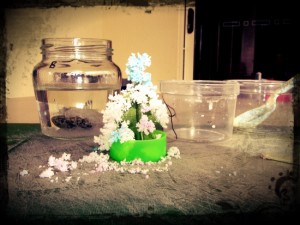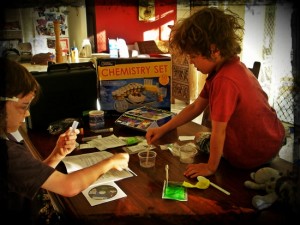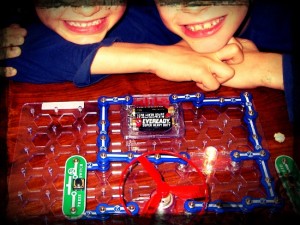
Table of Contents
Homeschool Science
Some potential homeschoolers are put off before they even start by the idea that you can’t teach science in a homeschool environment, without a school laboratory. This is yet another of those silly myths about homeschooling. You can teach science at home, it’s not so hard.
My homeschooled kids went on to sit exams in science and passed, no practical work required. As a former professional medical scientist, I can tell you that school practicals were not, in any way, useful to me and that every science experiment you can possibly think of is on YouTube.
One of the great positives of homeschooling in the modern world, is that those science experiments are there for you to watch any time, they’re no longer just a one-off in a school science lab that a child may or may not be understanding at the time.
Homeschool Science Needn’t Be Scary
I know a lot of homeschooling Mums (and a few Dads) who are scared of science. That’s understandable, a lot of people didn’t get on too well with biology, chemistry and physics in school. It would be a real shame for the children to pick up on that attitude, we need to dress it up, put a positive spin on it and make it fun for the homeschooled kids.
Can You Homeschool Science Without Having a Degree in Science?
I was a scientist in my life before kids, so maybe it’s a bit easier for me, but I’ve found that I’m coping really well with introducing other subjects to the children that I used to know very little about.
I never liked history, I wasn’t sure how I’d manage with my children. After a bit of reading around, online and from books, I’ve discovered that I LOVE history. So much for school! Go on, learn about science with your kids, you may learn to love homeschool science.
You just need to get things straight in your head first, get a good book, find out a bit about the progression of learning that is important in science, you have to understand x before tackling z, sort of thing. I find this Core Knowledge Sequence document very useful in planning which topics to cover next. Then you just need to grasp the scientific method and the concept of controlled experimentation and off you go.
You don’t have to become an expert overnight, just stay one jump ahead of the kids. Find some great scientific TV shows, Scope, Backyard Science, Deadly 60, and anything David Attenborough, the kids love it. I have a degree in zoology and biological sciences, David Attenborough and Steve Backshall talk about topics I covered at university.
Try searching YouTube for great little films on scientific topics. Here is one that we particularly loved on the periodic table, you just have to sing along!

Turning Your Home into A Homeschool Science Lab
Teaching science at home is not just possible, it’s easy. You’d be amazed just how much is possible with just basic kitchen science demonstrations and tricks.
Your kitchen, garage and garden are a great laboratory. You will have plenty of chemicals, reagents and equipment sitting on your shelves already, add a few amazing science toys, kits and games and you’re ready to go.
Science Laboratory Equipment at Home
You can even fill your home with full-on laboratory equipment, mini lab coats and test tubes if you want to, it’s all available online.
Before you break the bank buying equipment, give it some thought. Do you need measuring cylinders when you have kitchen jugs? Do you need beakers when you have old jam jars?
It would be lovely to buy a microscope or telescope. Get the best you can afford, cheaper optics are not much more than toys and you will need to upgrade to a better one later. A cheap magnifying glass is a lot better than all the fancy bug catchers and watchers you can buy, their plastic lenses are poor.
A top-end electrical circuit set, although way above primary school level, will see the children through to the end of their education.
Homeschool Science Fieldtrips
Science doesn’t just happen at home, go outside, visit a museum, an aquarium, a zoo, Even just walk in the park. You can talk about science anywhere. Why are leaves green? What are clouds? Does that animal have a backbone?
If you’re worried about measuring and recording and graphing, don’t be. If you’ve got a thermometer and a clock you can collect some great information about what’s going on outdoors.
Have a go, have fun with it and I hope you end up with smiling little faces just like these!

Online Homeschool Science Sites
The Kids Know it Network is brilliant for science, we particularly love their songs and the associated game Miamiopia. This free game helped get my eldest into reading and has allowed him to absorb scientific knowledge way beyond his years.
Homeschool Science. Ideas and links from a homeschooling former science teacher
Top 10 Cool Science Experiments.
Science at home, for younger children.
52 Science Experiments to do at home.
Wonder How To’s best YouTube Science Experiments.
National Geographic Kids. Discover Science.
Scistarter. An interesting idea that could be adapted for older kids. Citizen science research we can all get involved with.
ACS Science For Kids
There are loads of homeschool science resources that you can use at school. From workbooks, to YouTube channels to online learning programs. You can even buy boxed science curriculum. Best of luck with it. I have a science degree so I’m in a good position, but if you’re truly stuck, just leave me a comment below and I’ll try to help.
Leave a Reply